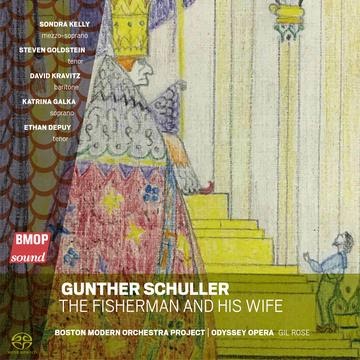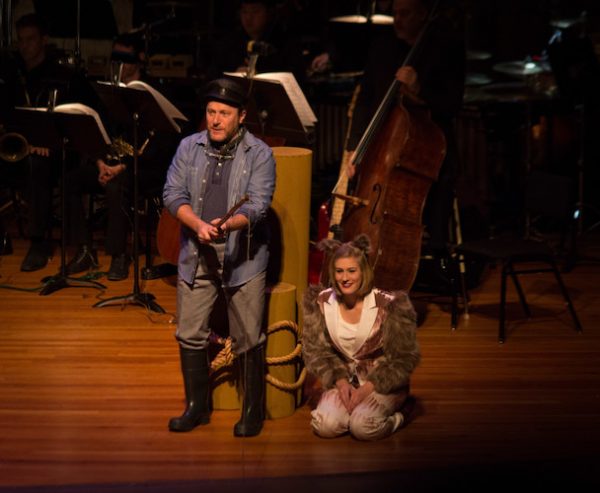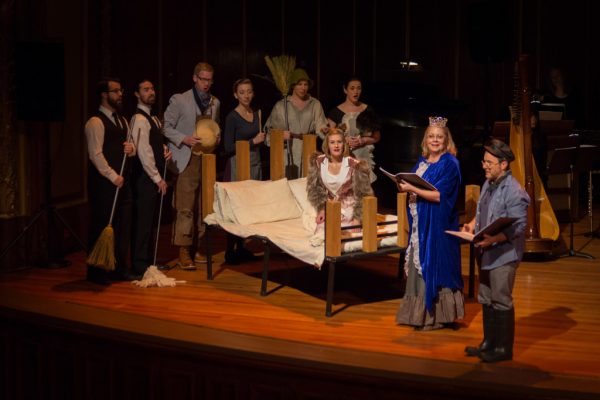Opera CD Review: Gunther Schuller’s Splendid 1970 Children’s Opera Gets Its World-Premiere Recording
By Ralph P. Locke
A Grimm, but not grim, opera about a Fisherman, his Wife, their Cat, and a wish-granting Flounder.
Gunther Schuller, The Fisherman and His Wife (one-act opera)
Sondra Kelly (Wife), Steven Goldstein (Fisherman), David Kravitz (the Magic Fish), Katrina Galka (the Cat), Ethan DePuy (Gardener)
Boston Modern Orchestra Project and Odyssey Opera, cond. Gil Rose
BMOP/sound 1070 — 65 minutes
To purchase, click here.
How wonderful to encounter an opera that sounds fresh and imaginative and has never been recorded before!

The Fisherman and His Wife, by Gunther Schuller (1925-2015), was first performed in 1970 at the Savoy Theater (known since 1980 as the Boston Opera House) by Sarah Caldwell’s intrepid and inventive Opera Company of Boston. It seems not to have been performed much since then.
Conductor Gil Rose’s two organizations, Boston Modern Orchestra Project and Odyssey Opera, came to the rescue of this work on 22 November 2015, putting on a concert performance — with limited costuming and on-stage movement, plus some visual projections—in the New England Conservatory’s Jordan Hall. The performance and the recording (made two days later in Tufts University’s 300-seat Distler Hall) were made possible by grants from the Koussevitzky Music Foundation and other donors, including friends and colleagues of Schuller’s.
In time for the work’s 50th birthday, the recording has now been released by Rose on BMOP’s and Odyssey Opera’s own quasi-private label. The result is as involving and heady an experience as any I have encountered from a post-1960 opera. I would put it up there with Daniel Catán’s 2010 Il postino, which I was delighted to encounter in a staged performance by Virginia Opera in Fall 2019. For me, Fisherman is a keeper, like John Adams’s Nixon in China (1987; videos here) or, from somewhat earlier, Gottfried von Einem’s Der Besuch der alten Dame (1971; I reviewed it at OperaToday.com). Or, to mention another chamber opera that Gil Rose’s folks have brought back from obscurity, Mario Castelnuovo-Tedesco’s The Importance of Being Earnest (1962), whose accompaniment is written solely for two pianos and craftily wielded percussion. (I reviewed it here.)
The Fisherman and His Wife derives from a tale by the Brothers Grimm that Schuller learned as a child. The informative booklet contains characterful illustrations for this very tale made by Schuller’s German-born mother, probably in the 1930s, when Schuller (born in Queens) was a schoolboy. (His memoir A Life in Pursuit of Music and Beauty gives a rich sense of his formative years and early career; unfortunately it stops around 1960.)
The libretto for the opera was fashioned by the great novelist and essayist John Updike, at a time when both he and Schuller were Massachusetts residents. (Schuller, after years of service as a horn player for the American Ballet Theatre and then the Metropolitan Orchestra, was president of the New England Conservatory in 1967-77. John Updike and his family lived in Ipswich from 1957 to 1974.) A fascinating 20-minute documentary includes an interview with Schuller, plus captivating excerpts from a TV production based on the first production.
The opera was (as the printed program put it) “commissioned by the Junior League of Boston as a 60th Anniversary Gift to the Children of Boston.” The libretto is very schematic, involving much varied repetition of events and phrases, all of which makes for easy comprehension, despite the often-challenging nature of Schuller’s music.

Steven Goldstein and Katrina Galka in in the Odyssey Opera/BMOP performance of The Fisherman and His Wife. Photo: Kathy Wittman.
The basic story is that the (unnamed) Fisherman is prevailed upon by his endlessly unsatisfied Wife — we do hear her name: Ilsebill — to upgrade their simple hut. She insists that he make this demand of a magical Fish that he has caught and released. The Fish speaks, because (as it explains) it is “an enchanted prince.” Each time the Fisherman goes to the shore, the Fish grants the Wife’s current wish, and then, when the husband returns home, the Wife raises the ante. First the hut becomes a cottage; then, at her second demand, a castle; next she insists on becoming a queen, then a king, the pope, and finally God (so she can command the sun or moon to stop). This last request being too outrageous, the Fisherman and his Wife find themselves back in their simple hut — which they now appreciate more fully.
Updike clearly enjoyed playing with the folk tale, embellishing it with fanciful and highly imaged language as well as tart social commentary: “Husband, how much sweeter it would be if everything I thought became a law, and every sneeze became a holiday, and every cough a cause for national mourning.” Updike also invented an extra character: the couple’s pet Cat, who reacts visibly to all kinds of happenings on stage and occasionally also sings (as does a chorus, in a few passages as the Wife’s wishes become extreme).
Sarah Caldwell stage-directed the premiere and Schuller conducted. She repeatedly tried to get him to simplify the elaborate stage directions, such as the cat’s extensive and no doubt distracting facial gestures, scampering, and slinky jumping. The lighting may have posed challenges as well: Updike calls for specific contrasts of color from scene to scene as the sea becomes stormy and as the anthropomorphic Fish grows menacingly large. The sets and costumes, though, were kept simple, attractive, and appropriate.
The 2015 concert performance was a far simpler affair, putting the emphasis on the music and words, rather than on theatrical illusion. This is, after all, still a folk tale, and a stripped-down presentation may suit it. For that matter, hearing the work on a CD, with the libretto in hand, may be a particularly good way to encounter this fascinating study in the sins of pride, greed, and (on the husband’s part) spinelessness.

Composer Gunther Schuller — in his score the accessible rubs shoulders with the near-arcane.
Schuller’s compositional style was often a highly idiosyncratic hodge-podge of Schoenbergian 12-tone, Stravinskyan rhythmic dynamism, and much more. Here the accessible rubs shoulders with the near-arcane. Angular, leaping melodic lines make stiff demands on singer and listener alike. But Schuller’s deep knowledge of jazz (he wrote pathbreaking histories of early jazz and the Swing era) creeps into the orchestral accompaniment at moments, as when the Wife complains about the hut’s rotten floor and leaking roof (toward the end of track 3), during the creepily catchy duet in which Fish and Cat compare the mysteries of humans’ married life to the odd creatures living in the dark sea (end of track 8), and during the chorus’s spoken recitation of the items that the Wife obtains by becoming a king (“A floor that is one continuous emerald four feet thick”).
Best of all is Schuller’s consistent and intriguing distinction between the peppery demands of the Wife and the subdued, often lyrical replies of the poetic, long-suffering Fisherman. There are additional surprises along the way, as when an obedient Gardener appears (in the “castle” scene), or when Cat wonders if Fish can really talk, and the latter, tauntingly, meows. Kids in the audience must have enjoyed that! (Adults, too, I confess.)
Updike’s increasingly elaborate imagery turns the series of wishes (uttered, then granted) into a verbal theme-and-variations. For example, early on the Fisherman, alone by the shore and pondering the majesty of the sea, invokes images that will recur: palace, king, and, yes, God. Similarly, Schuller brings back certain musical materials again and again. Sometimes the repetition is more or less literal: the Fisherman often moans, to an increasingly familiar melodic phrase, “It is not the right thing to do.” Other times a moment is given a fresh, expansive twist, as when the chorus elaborates on the wife’s oft-repeated line “Look what I wished with my wish!” The opera’s eventual, sudden return to simplicity brings the work to a satisfying, full-circle close.
The chamber orchestra includes a wide variety of instruments, such as a dozen strings, electric guitar, celesta, an organ (at one point playing single notes quickly and softly), and pairs of winds including saxophones. This allows for much contrast in separate and mixed timbres — all without overpowering the voices. Frequent orchestral interludes indicate time passing, echo onstage action (e.g., when the Cat reacts in surprise to some decision by the couple), or emphasize the ever-increasing scale of the Wife’s wishes. The next-to-last scene, for example, begins with hefty storm music (the Flounder is getting angry!), giving the five brass players and two percussionists a workout.
The performance here helps enormously: all five singers have well-produced voices and project the words clearly. My favorite is the tenor, Steven Goldstein, as the Fisherman, his voice sweet and firm at all moments, perfectly on pitch. Sondra Kelly’s capacious mezzo contains a touch of wobble that makes the Wife seem appropriately annoying and no longer young. The disparity between the two characters can be sensed through their vocal tone alone, as in the opera’s gentle concluding scene. Rose’s orchestra and six-person chorus perform splendidly, and the recorded sound captures everything in comfortable balance.

The cast of the 2015 Odyssey Opera/BMOP performance of The Fisherman and His Wife. Photo: Kathy Wittman.
Though Schuller and Updike would probably not have imagined this, the work is near-ideal for home listening, with the libretto (and its stage directions) in hand to help one envision the onstage action and shifts of mood. The almost century-old illustrations by Schuller’s mother — and one photo apiece from the 1970 and 2015 productions — allow one’s imagination to soar. An online video of excerpts from the 2015 performance gives a further sense of how well the work can come across in public. Yet another equally captivating video shows the work in rehearsal and includes interview excerpts with Gil Rose.
I would encourage opera companies, including college-level opera workshops, to experiment with ways to put this splendid and almost-new opera on stage, perhaps paired with some other fairy-tale stagework, such as Stravinsky’s The Nightingale or the attractive Nightingale: A New Musical, by Broadway composer Charles Strouse (based on the same Hans Christian Andersen story that Stravinsky used).
Bravo to Gil Rose and his devoted singers and players for bringing this major work out of undeserved obscurity. May its fame grow as big as a castle! (The complete recording is available on YouTube and other streaming services. The booklet that comes with the CD can also be downloaded here at no cost.)
Ralph P. Locke is emeritus professor of musicology at the University of Rochester’s Eastman School of Music. Six of his articles have won the ASCAP-Deems Taylor Award for excellence in writing about music. His most recent two books are Musical Exoticism: Images and Reflections and Music and the Exotic from the Renaissance to Mozart (both Cambridge University Press). Both are now available in paperback; the second is also available as an e-book. He contributes to American Record Guide and to the online arts-magazines NewYorkArts.net, OperaToday.com, and The Boston Musical Intelligencer. His articles have appeared in major scholarly journals, in OxfordMusicOnline (Grove Dictionary), and in the program books of major opera houses, e.g., Santa Fe (New Mexico), Wexford (Ireland), Glyndebourne, Covent Garden, Bilbao, and the Bavarian State Opera (Munich).
Tagged: Boston Modern Orchestra Project, Gil-Rose, Gunther Schuller, John-Updike, Odyssey Opera

[…] full review of this CD, see my colleague Ralph Locke’s detailed discussion, with examples, at https://artsfuse.org/202805/opera-cd-review-gunther-schullers-splendid-1970-childrens-opera-gets-its…. More about the disk at […]
[…] Rouen, Mario Castelnuovo-Tedesco’s The Importance of Being Earnest, William Alwyn’s Miss Julie, Gunther Schuller’s The Fisherman and His Wife, and Carlisle Floyd’s Prince of Players. Each is based on a pre-existing story, often rather well […]